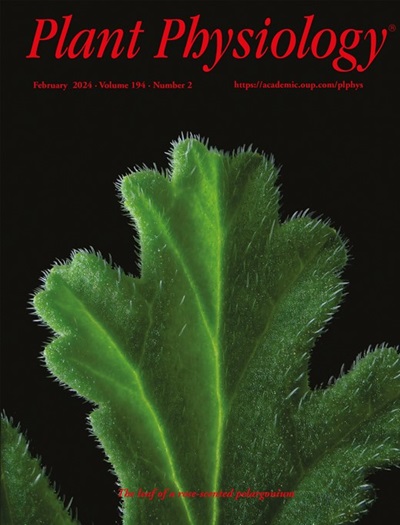染色体加倍可提高猕猴桃中 PECTIN METHYLESTERASE 2 的表达、生物量和渗透胁迫耐受性
IF 6.5
1区 生物学
Q1 PLANT SCIENCES
引用次数: 0
摘要
染色体加倍诱导的多倍体化是作物育种的常用工具。多倍体作物通常具有多种优势,包括增加生物量和抗逆性。然而,人们对产生这些优势的基因知之甚少。我们发现猕猴桃(Actinidia chinensis cv. Hongyang)果胶甲酯酶 2(AcPME2)在人工培育的四倍体植株中被大幅上调,这些植株的生物量增加,对渗透胁迫的耐受性增强。在拟南芥(Arabidopsis thaliana)、番茄(Solanum lycopersicum)和猕猴桃中,AcPME2的过表达(OE)导致生物量增加并增强了对胁迫的耐受性。与 Col-0 植物相比,在短期渗透胁迫处理后,AcPME2-OE 植物表现出更高水平的脱甲基酯化果胶和细胞壁中更多的 Ca2+ 积累,从而导致细胞壁硬度增加。胁迫诱导的解痉实验表明,AcPME2能动态介导细胞壁硬度对渗透胁迫的响应,而这种响应依赖于Ca2+的积累。转录组分析发现,在渗透胁迫下,AcPME2-OE植株的数十个胁迫响应基因显著上调。此外,AcPME2介导的细胞壁加固防止了渗透胁迫下细胞壁的塌陷和变形。我们的研究结果表明,单个基因促成了多倍体化的两个优势(增加生物量和抗渗透胁迫),而且 AcPME2 可动态调节细胞壁硬度以应对渗透胁迫。本文章由计算机程序翻译,如有差异,请以英文原文为准。
Chromosome doubling increases PECTIN METHYLESTERASE 2 expression, biomass, and osmotic stress tolerance in kiwifruit
Chromosome doubling-induced polyploidization is a popular tool for crop breeding. Polyploidy crops commonly have multiple advantages, including increased biomass and stress tolerance. However, little is known about the genes responsible for these advantages. We found kiwifruit (Actinidia chinensis cv. Hongyang) PECTIN METHYLESTERASE 2 (AcPME2)is substantially upregulated in artificially created tetraploid plants that show increased biomass and enhanced tolerance to osmotic stress. Overexpression (OE) of AcPME2 led to increased biomass and enhanced stress tolerance in Arabidopsis (Arabidopsis thaliana), tomato (Solanum lycopersicum), and kiwifruit. Upon short-term osmotic stress treatment, AcPME2-OE plants showed higher levels of demethylesterified pectins and more Ca2+ accumulation in the cell wall than Col-0 plants, which led to increased cell wall stiffness. The stress-induced plasmolysis assays indicated that AcPME2 dynamically mediated the cell wall stiffness in response to osmotic stress, which is dependent on Ca2+ accumulation. Transcriptomic analysis discovered that dozens of stress-responsive genes were significantly upregulated in the AcPME2-OE plants under osmotic stress. Besides, AcPME2-mediated cell wall reinforcement prevented cell wall collapse and deformation under osmotic stress. Our results revealed a single gene contributes to two advantages of polyploidization (increased biomass and osmotic stress tolerance) and that AcPME2 dynamically regulates cell wall stiffness in response to osmotic stress.
求助全文
通过发布文献求助,成功后即可免费获取论文全文。
去求助
来源期刊

Plant Physiology
生物-植物科学
CiteScore
12.20
自引率
5.40%
发文量
535
审稿时长
2.3 months
期刊介绍:
Plant Physiology® is a distinguished and highly respected journal with a rich history dating back to its establishment in 1926. It stands as a leading international publication in the field of plant biology, covering a comprehensive range of topics from the molecular and structural aspects of plant life to systems biology and ecophysiology. Recognized as the most highly cited journal in plant sciences, Plant Physiology® is a testament to its commitment to excellence and the dissemination of groundbreaking research.
As the official publication of the American Society of Plant Biologists, Plant Physiology® upholds rigorous peer-review standards, ensuring that the scientific community receives the highest quality research. The journal releases 12 issues annually, providing a steady stream of new findings and insights to its readership.
 求助内容:
求助内容: 应助结果提醒方式:
应助结果提醒方式:


